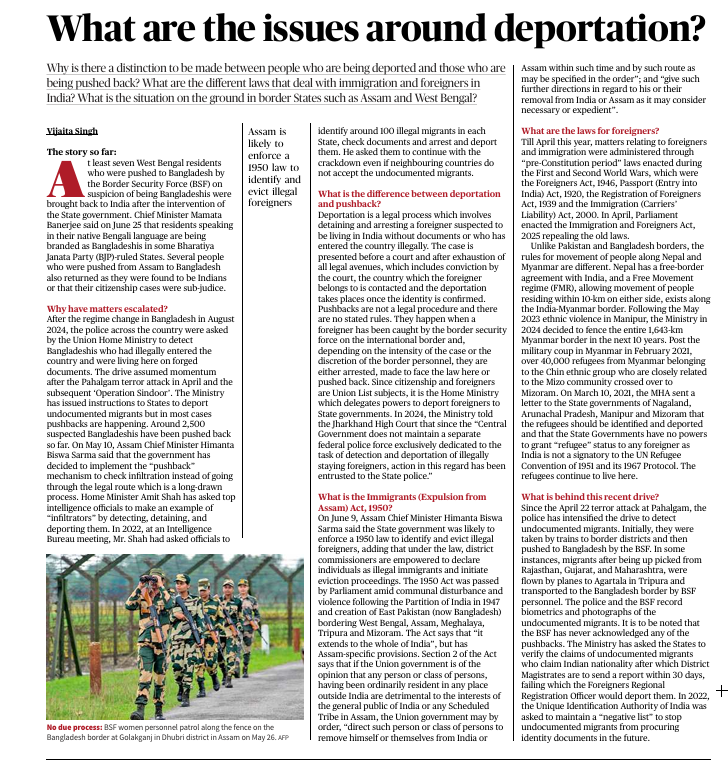1. Context: Deportation and Pushback Incidents
- Recent incidents in West Bengal and Assam show people being pushed back to Bangladesh or detained on suspicion of being illegal immigrants.
- Many of those being deported/pushed back speak Bengali and are assumed to be from Bangladesh.
- Assam CM and Union Home Ministry have increased efforts to detect and deport illegal foreigners.
2. Terminology Clarified: Deportation vs Pushback
🔹 Deportation:
- A legal process involving:
- Arrest and detention.
- Judicial scrutiny in court.
- Proof that the person entered illegally and has no valid documents.
- Arrest and detention.
- Deportation follows due process, especially for those who have been living in India long-term.
🔹 Pushback:
- A non-legal practice, typically done at the border by security forces.
- Individuals caught crossing without documents are immediately returned, often without formal procedure.
- Increasingly used as a deterrence measure, especially in border states like Assam.
3. The Role of the Foreigners Act, 1950
- Section 2 of the Act empowers district magistrates to:
- Identify illegal foreigners.
- Issue expulsion orders.
- Arrest and remove them.
- Identify illegal foreigners.
- Based on this, Assam is implementing an expulsion campaign against “illegal immigrants”.
- No requirement for central clearance in deportation unless the individual is a citizen of another country.
4. Policy Differentiation by Origin
- Nepal and Bhutan: India has Free Movement Agreements (FMA)—residents can move freely within 10–16 km of the border.
- Bangladesh and Myanmar: Require visas and valid documentation.
- Influx from Myanmar into Mizoram: India has treated Myanmar refugees (e.g., Chin community) with more humanitarian concern.
5. Challenges and Controversies
- No formal repatriation agreement between India and Bangladesh.
- In the absence of formal recognition by Bangladesh, people deported may be re-admitted to India or rendered stateless.
- Confusion and conflict arise over:
- Identity documentation.
- Religion and language-based profiling (especially Bengali-speaking Muslims and Hindus).
- Identity documentation.
- Critics argue this violates humanitarian standards and international refugee protections (e.g., UN Refugee Convention, which India is not a signatory to).
6. Recent Trends & Political Angle
- Since April 2024 attacks, there’s been a surge in enforcement, especially in Assam, Bengal, and Tripura.
- The pushback policy is politically charged and often targets specific communities (e.g., Bengali-speaking Muslims).
- States like Jharkhand have objected to pushbacks without judicial due process.
7. Constitutional and Human Rights Dimensions
- Deportation affects Article 21 rights (Right to Life and Liberty).
- Risk of discrimination and statelessness, especially for people born in India without proper documentation.
- Refugee protections are not codified in Indian law—handled under discretionary state powers and the Foreigners Act.
UPSC GS2-Style Questions (Governance, Internal Security, Human Rights)
🔹 10-Marker (150 words)
- Differentiate between deportation and pushback in the context of India’s immigration control mechanisms.
- Discuss the legal and humanitarian challenges associated with India’s deportation of illegal immigrants.


